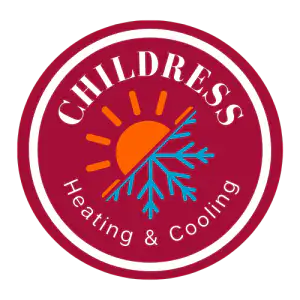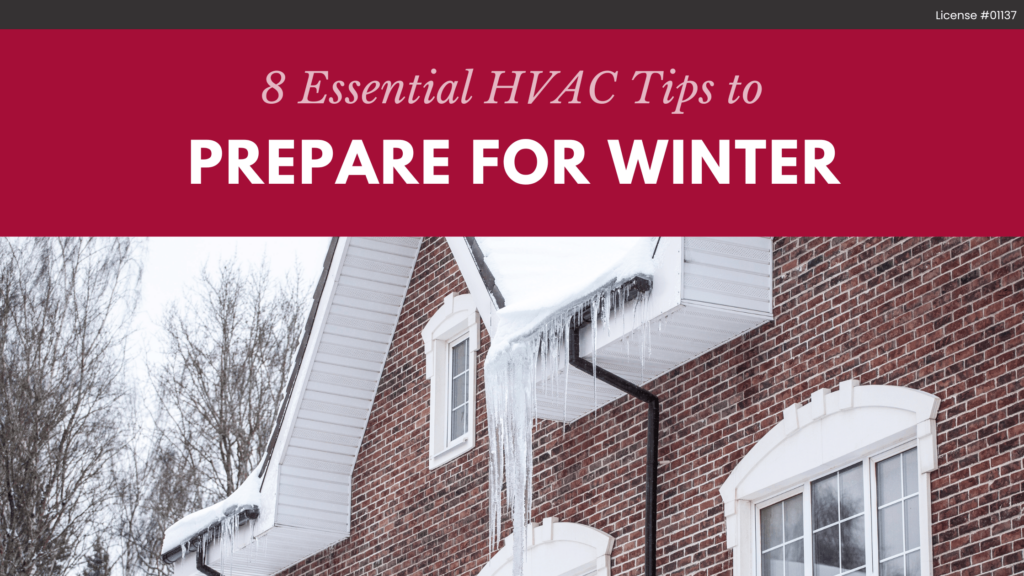As the temperatures drop and winter approaches, your HVAC system becomes one of the most critical components in keeping your home warm and comfortable. Proper preparation can ensure that your system runs efficiently throughout the colder months, preventing unexpected breakdowns and costly repairs. In this blog post, we’ll walk you through eight essential HVAC tips to prepare your system for winter, ensuring your home stays cozy all season long.
1. Replace Air Filters
One of the simplest yet most important steps in HVAC maintenance is replacing your air filters regularly. Dirty or clogged filters restrict airflow, making your system work harder and increasing energy consumption. During the winter months, a clean filter is essential for efficient heating.
How Often Should Filters Be Replaced? Generally, you should replace air filters every 1-3 months, depending on your household’s needs. If you have pets or allergies, you may need to change them more frequently.
2. Schedule a Professional HVAC Tune-Up
A professional tune-up ensures your heating system is working efficiently and safely. During a tune-up, a technician will inspect, clean, and adjust your system’s components, identifying potential issues before they turn into costly repairs. This is especially important before winter when your system will be working harder than usual.
Why Is a Tune-Up Important? A well-maintained system is more efficient, less prone to breakdowns, and can extend the lifespan of your equipment.
3. Check Your Thermostat Settings
Ensure your thermostat is set to a comfortable temperature for winter. If you don’t already have a programmable or smart thermostat, consider upgrading to one. These devices can help you save energy by automatically adjusting the temperature when you’re asleep or away from home.
Optimal Winter Thermostat Settings The U.S. Department of Energy recommends setting your thermostat to 68°F while you’re awake and lowering it when you’re sleeping or out of the house to save on heating costs.
4. Seal Air Leaks Around Windows and Doors
Drafts can cause your HVAC system to work harder than necessary, leading to higher energy bills and uneven heating. Sealing air leaks around windows and doors with weatherstripping or caulk can help keep warm air inside your home.
How Do I Check for Drafts? Run your hand along windows and doors. If you feel a slight breeze, you likely have an air leak that needs to be sealed.
5. Inspect and Clean Ductwork
Your HVAC system’s ductwork is responsible for distributing warm air throughout your home. If your ducts are dirty or have leaks, your system will be less efficient, and your home may not heat evenly.
When Should Ducts Be Cleaned? Experts recommend cleaning your ductwork every 3-5 years or more frequently if you notice dust buildup, poor airflow, or an increase in allergies or respiratory issues.
6. Test Your Carbon Monoxide Detectors
During the winter, your heating system runs more frequently, increasing the potential for carbon monoxide buildup. It’s crucial to ensure your carbon monoxide detectors are working properly to keep your family safe.
How Often Should I Test My Carbon Monoxide Detectors? Test your carbon monoxide detectors at least once a month and replace the batteries regularly.
7. Keep Outdoor Units Clear
If you have a heat pump, it’s essential to keep the outdoor unit free of debris like leaves, dirt, or snow. A blocked unit can reduce efficiency and may even cause your system to overheat or shut down.
How Do I Maintain My Outdoor Unit? Check the outdoor unit regularly and clear away any obstructions. During heavy snowfalls, gently brush off snow from the unit.
8. Consider Upgrading Your System
If your HVAC system is more than 10-15 years old, it may be time to consider a replacement. Modern systems are more energy-efficient and can significantly lower your heating bills. Plus, if your current system is struggling to keep up with the cold, upgrading can provide more reliable comfort for your family.
How Do I Know If I Need a New System? If your system requires frequent repairs, doesn’t heat your home evenly, or causes high energy bills, it may be time for an upgrade.
FAQs:
Q: How often should I schedule HVAC maintenance?
A: It’s recommended to schedule maintenance twice a year—once before the summer cooling season and again before winter heating season.
Q: What are the benefits of upgrading to a smart thermostat?
A: Smart thermostats can help reduce energy costs by automatically adjusting temperatures when you’re away or asleep, ensuring your home stays energy-efficient.
Q: What should I do if my system is blowing cold air?
A: Cold air from your HVAC system could indicate an issue with the thermostat, a clogged filter, or a more serious mechanical problem. Contact a professional to diagnose and repair the issue.
Contact Us
Childress Heating & Cooling is your local American Standard Customer Care dealer serving Southside, Gadsden and Etowah County communities for over 20 years. If your home’s comfort system needs attention, or if you believe you might need a new HVAC system, call us at 256-312-1893 or visit our website. We’re proud to be our community’s #1 choice when it comes to heating and cooling.
- Phone: (256) 312-1893
- Email: [email protected]
- Website: Childress Heating and Cooling
Follow Us on Social Media
- Facebook: Childress HVAC
- Instagram: @childresshvac
- Pinterest: Childress Heating and Cooling

